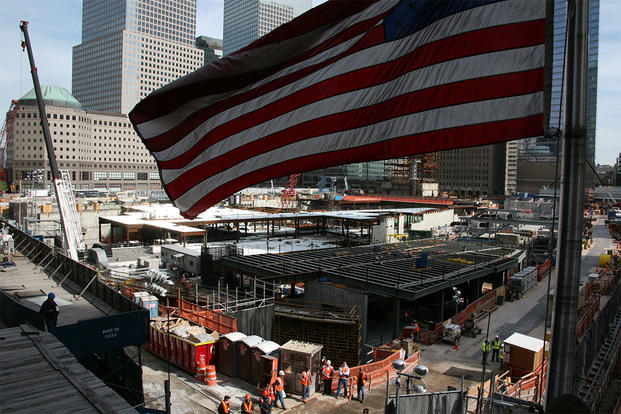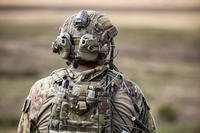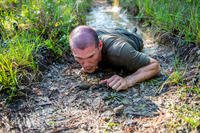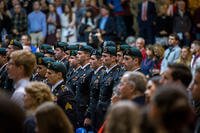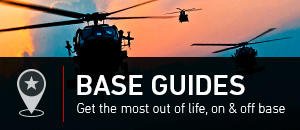In commemoration of Patriot Day and those who lost their lives on 9/11, we present an Army article from Soldier Magazine on two Soldiers' experiences that day.
September 11, 2001 dawned as a perfect late summer day with beautiful weather and a clear blue sky. It was the kind of day almost anyone would be happy to spend outdoors — anyone, that is, but now-New York National Guard Capt. Thor Johannessen.
At the time, he was an 11-year veteran of the New York City Fire Department, assigned to its elite Special Operations Command. His job was to rescue other firefighters, as well as victims of building collapses and airplane accidents. He'd spent the summer helping train new firefighters and all he wanted was to get back to work at Rescue Company 1. He didn't want to trek all the way out to the Bronx and waste two days in a mandatory scuba diving refresher course.
But as he put on his scuba gear and prepared to dive into the Long Island Sound from Fort Schuyler with a clear view of the lower Manhattan skyline, he had no idea that his wish would come horrifically true, that he, New York and the United States were on a collision course with history.
He didn't know that 19 Muslim terrorists had just hijacked four cross-country flights, and that two were headed for one of his city's most visible landmarks, the World Trade Center's twin towers, or that by nightfall, some 3,000 Americans would be dead — including 11 firefighters from his own 27-officer company.
Like any first responder, Johannessen had known for years that New York City was a terror target. But a catastrophic attack in Manhattan was almost unimaginable — until one of Johannessen's classmates, a fellow officer from Rescue 1, glanced across the water shortly after 8:46 a.m., the moment the first plane hit the North Tower.
"'Holy cow,' he said, 'Look at the chop at the Trade Center,' a chop being a fire. I turned around and couldn't believe the amount of fire that was in that first building," Johannessen remembered. The second plane crashed into the South Tower at 9:03 a.m., and they were recalled from training.
Across town in northern Manhattan, police Detective Lou Delli-Pizzi — a good buddy of Johannessen's from the NYANG, where he too is a captain — was on the trail of a robbery suspect. He had been on duty since the previous afternoon, so when his wife called to tell him about the Trade Center, Delli-Pizzi assumed it had been a small Cessna-like plane, but he turned on his police radio and then a commercial station anyway.
"After awhile…you hear different tones of people's voices over the police or Army radio, and you can kind of gauge the severity of the situation," he said. "I could hear that it was a pretty significant incident. Then I remember turning on the local news radio and there was a news chopper pilot…talking about a commercial jet. I remember another plane hitting the towers and…at first I thought it was an instant replay." As he spotted clouds of smoke billowing from downtown, he wanted to believe that the disaster was the result of some kind of navigational error or equipment failure.
Like Johannessen, Delli-Pizzi was almost immediately recalled. The 13-year police veteran was disturbed by the reluctance of some of his fellow cops to respond, but more so by the concern on the faces of senior, 40-year veterans in his squad. These men were unflappable and even they were shaken.
"I remember being in the car with my buddy going from scuba training down there, thinking 'these things aren't easy to admit to yourself' — I don't want any part of this,'" Johannessen echoed. "'This isn't good what's going on down there and a lot people are going to die.' Members of Rescue 1 would be right in the front. If there were people to be rescued, they'd be rescuing them. If firemen needed help, they'd be there. That's what I was thinking: 'If my guys need help, who's going to be there to help them?'"
Together with another officer who was called in from home, the two firefighters made it to ground zero just as the South Tower began to collapse at 9:59 a.m., finding a scene of overwhelming destruction. They were shocked. They thought they had seen everything, but nothing could have prepared them for this. Two hundred firefighters were already missing.
"It was really like a war scene off a movie set with fire trucks flipped over and on fire," Johannessen said. "There was a big natural gas leak — you could smell gas in the air. It was a horror."
Delli-Pizzi arrived between the two collapses (the North Tower collapsed at 10:28 a.m.), and described the scene as "nuclear fallout." The cloud of smoke and debris was "intense," and thousands of New Yorkers were fleeing on foot. Especially strange, he thought, were all the shoes that littered the site. "I don't know if people just kind of ran out of their dress shoes or discarded their shoes as they were running. It's an odd memory."
The fires burned for about three months, and both Delli-Pizzi and Johannessen were part of rescue efforts that eventually turned to the gruesome and heartbreaking task of recovery. Johannessen explained that the destruction was so complete, all that remained was twisted steel and concrete. They never found a desk, a telephone or a computer. "But then in the middle of all that we might find somebody's wallet. The further we dug in this pulverized concrete and debris, we found people."
Between them, Johannessen and Delli-Pizzi found only one person alive in the wreckage: a firefighter and Vietnam vet Johannessen had known for years.
He "had been outside…extinguishing car fires and the building came down around him," Johannessen remembered. "I didn't recognize him, even when he told me his name. He'd had his teeth knocked out and I couldn't understand him. I'd known this guy for 10 years and I didn't know who he was. We were able to get him out somehow. (He) was the only person who I was involved in rescuing. I'm glad I had that one experience."
Just as a Soldier goes into battle for the men on his left and right, he explained, he was able to face ground zero almost every day for about six months for his fallen teammates and their families. As long as they were there, that was where he belonged.
"It was my job," agreed Delli-Pizzi, who was assigned to ground zero for weeks. "It was my mission."
Both he and Johannessen have a hard time remembering everything they saw and felt, and Johannessen added that if he never returns to ground zero, it will be too soon. Delli-Pizzi has visited the site a few times, and he sees the skyline every day on his commute. "It's like seeing somebody smile with a tooth missing," he explained. It's something that will always be with them.
Their regular missions didn't stop because of the Sept. 11 response. Someone still needed to fight crime, direct traffic and put out fires. It was, to Delli-Pizzi's recollection, the first time the NYPD and the NYFD ever needed assistance. Police officers and firefighters from New Jersey, Long Island, Florida, Chicago and Los Angeles came to their aid. Even retired firefighters streamed into New York to work at ground zero.
So did the Army.
"You never saw any type of military in New York City," Delli-Pizzi said. "I can remember on that day hearing military aircraft flying relatively low to the ground. Later that afternoon, I could see the camouflaged guys of…the 69th Infantry (Division)…the first military unit to respond to the attacks. I remember saying to myself, 'Here I am in the greatest, biggest police department in the world, and the Army's got our back. I've got to get with these guys.'"
Feeling immensely lucky that no one from his immediate squad or his family was killed on 9/11, Delli-Pizzi knew he had to give something back. At the same time, Johannessen had always wanted to follow in the footsteps of his grandfather and namesake, who had fought with the 10th Mountain Division during World War II. He had just never been "properly motivated" until that day.
Both men were able to get age waivers and were commissioned into the same Guard unit, the storied Fighting 69th, which dates back to the Civil War. Their subsequent training, drill and deployment requirements meant significant personal and professional sacrifices, but both men discovered that the Army made them better at their civilian jobs. At the same time, they brought valuable law enforcement and search and rescue experience to the Army.
Johannessen, for example, is assigned to Joint Operations (J-3) at the NYANG Joint Force Headquarters. His experience on the NYFD as part of the Federal Emergency Management Agency's New York Urban Search and Rescue team helped get him the assignment, which he called a good fit, because it lets him bring "real-world tactical first-responder stuff to Special Operations."
That included a two-week deployment to Haiti just days after a magnitude-7 earthquake decimated that country's capital, Port-au-Prince, and the surrounding areas, Jan. 12, 2010.
His team rescued several people from a collapsed grocery store the very day they arrived. The city, he said, reminded him eerily of ground zero. "It was brutal. That amount of destruction — parts of it were very reminiscent of work at the Trade Center with all of that pulverized cement and collapsed buildings. That really is a Third World country, and we don't really appreciate what a Third World country is like until we see one. There were horrible conditions."
And while Delli-Pizzi was attending the Army Infantry School at Fort Benning, Ga., a colonel came from the War College at Carlisle Barracks, Pa., to discuss counterinsurgency tactics the Army was using in Iraq. As he talked about identifying "bad guys" who mixed in with the local population, reclaiming an Iraqi city block by block and building schools and infrastructure, it started to sound very familiar to Delli-Pizzi.
"I said, 'He's talking about an insurgency as almost like a gang,'" Delli-Pizzi remembered. "'It's almost like the neighborhoods we won back over in the early '90s in New York City.' I worked in a precinct that had…about 117 homicides in one year — those are the ones we knew about — and 25 police-involved shootings. Those communities were won back one block at a time by getting rid of the drug dealers. Not just by putting them in jail or by engaging in gun battles, but by winning over the community and ensuring that…the young kid in the neighborhood had an opportunity. We built schools. We did all of that.
"I kind of came to realize, 'Hey, I've got all this stuff we learned in the police department that's effective in community policing, effective in getting rid of gangs and drugs and violence. This is something we can use (in the Army).' That's why I think reserve-component guys, certainly cops and firemen…guys who have experience in those types of units, have an awful lot to offer," he continued.
Delli-Pizzi deployed to Afghanistan in 2007 as a member of an embedded training team with the Afghan National Army. Their shared experiences with terrorism "with the people who had destroyed part of his city and their country" was powerful enough to bridge their cultural differences. After one intense engagement, the Afghan soldiers even honored Delli-Pizzi and the other American Soldier on their team by giving them the leg of a goat they had cooked.
"They said we had earned it with our legs and by helping them," Delli-Pizzi remembered. "They told us that we had given them the strength and the legs to fight the bad guys in their community. We talked about 9/11 that day, and we said we were there for a common kind of mission to protect freedom and liberty for everybody.
"Three thousand people were killed, essentially on my watch, on 9/11," he continued. "I was a detective in Manhattan, I was on duty and it happened right under my nose. For me, going to Afghanistan was almost like a continuation of my duty…trying to do my part to make sure that never happened again. I was taking the fight back to (al-Qaida). It was like I just transferred to a different precinct."
